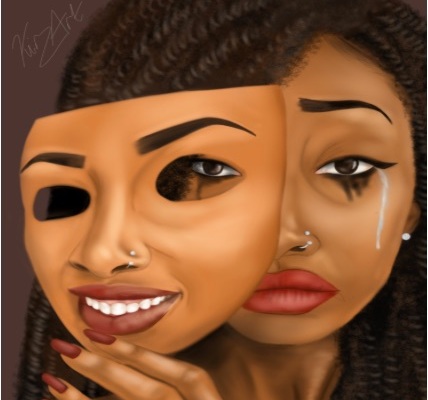Mental health disorders and conditions are one of the many things in this world that isn’t picky about its subject. It isn’t biased to one gender, race, cultural background, or socioeconomic status. However, your socioeconomic status in this country does play a major role in how Black people can seek out the proper assistance on how to combat such a draining reality.
African Americans, in particular, are 10% more likely to experience and suffer from the more critical cases of mental health such as depression, PTSD, and schizophrenia. Most Black individuals don’t even get properly diagnosed for these conditions — and others — due to the lack of resources and the stigma behind mental health as it pertains to predominantly African cultures.
The stigma of mental health coincides with the pattern of not showcasing “weakness” to others. Being constantly portrayed as this strong, persevering figure (which is definitely true) can also be extremely draining.
How many times have you heard your mother utter those void-filled words “what goes on in my house, stays in my house”? or “I keep clothes on your back, food in your mouth, and a roof over your head — what do you have to be sad about?” Being raised in an environment where you constantly hear phrases like that can lead a person to not allow themselves to feel vulnerable. They’ll never feel comfortable asking for help or just venting because they’re supposed to swallow it and keep a strong front.
Raynell Carter, an at-home babysitter located in Miami, Florida spoke up on her struggles with mental illness. “Man, let me tell you, it’s [depression] been hard. Sometimes, I don’t even want to get out of bed. But I got to ‘cause how else this money gon’ be made? So, I just suck it up and listen to my music then go on ‘bout my day” Carter said.
Part of the stigma in the Black community is that many define mental health issues as feeling sad all the time. It’s much more than just feeling “sad” or “anxious”, it can take over your entire mind as if it’s kicked you in the passenger seat and has taken over the wheel. You feel out of control, helpless, and worthless.
There are ways to combat these illnesses, because that’s what they are, real illnesses. Getting properly diagnosed is vital so that you can determine which avenues of healing work best for you. There are medicinal options, holistic, and therapeutic.
But, are the resources for Black people accessible?
It’s no secret that Black people face the biggest discrimination in the world, healthcare is no different. Insurance is unnecessarily high, jobs are scarce, and some health providers honestly don’t cater to the Black community. The government is no help either. Just look at the low-income communities they try to force us to stay boxed in. Count how many mental health institutions that you see and compare them to the number of liquor stores that they pile in our neighborhoods.
We deserve better. And, it’s been proven time and time again that if we want to accomplish something for the betterment of our people, we have to do it ourselves. Starting first with demolishing the stigmas and stereotypes encompassing our Black people. Educating ourselves on the reality of mental health conditions, how they started, and why suicide is the 3rd leading cause for death in the African American community. Breaking the cycle of invalidating someone else’s feelings based purely on material excuses.
We have been subjected to generations of trauma and misconduct. It’s time to heal and rise up as a unit so that we may be better for the generations to come after us.
Aaliyah Fisher is a staff writer for The Paradigm Press. For more information regarding this or other stories, email afisher2018@fau.edu .


Perfectly Written, thank you for bringing attention to this.
LikeLike